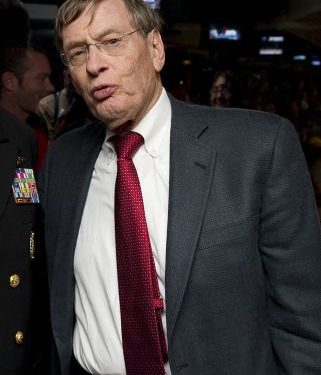Allan H. “Bud” Selig’s reign as MLB commissioner has come to a conclusion as Rob Manfred assumed the office on Jan. 25. Over 22 years, Selig has been the man in charge of professional baseball, and public opinion has been split on the divisive figure. Despite his flaws and mistakes, the ninth commissioner of baseball will go down as the best in history.
To understand the progress the league has made, it is crucial to return to the landscape of baseball in 1992 when the owner of the Milwaukee Brewers came to the helm of the entire league. Attendance was lagging and revenues were short. Small market teams were complaining about competitive imbalance and the MLB Player’s Association (MLBPA) was showing hostility to owners in unfair salary negotiations.
Half of the 26 teams failed to attract two million fans into the park; this past year, all but five teams had that many supporters at the stadium, even with an overall decrease in attendance recently. In 2011, Selig reflected on how he was disappointed with the league’s total revenue of $1.2 billion when he took over, only to have it expand more than six-fold in his first 19 years at the helm.
In his time, MLB has expanded to include four more teams, each with varying levels of success in its short time in the league. In his 22 seasons, 22 teams opened up new home stadiums, which are generally preferred to the cookie-cutter stadiums of the previous generation and allow for more overall baseball entertainment.
Selig introduced some controversial aspects to the game that may not have been met with universal admiration, but have nevertheless been great successes. In the 1994 season, MLB created the wild card system and added an additional division in each league to double the amount of playoff teams to eight per season (although no postseason was played that year). In the 2012 season, each league added an additional wild card team with the two non-division winning playoff teams facing off in a one game playoff. The league introduced interleague play in 1997.
A major reasoning for the MLB players’ strike in 1994-1995 is competitive balance. Selig gave the revenue-sharing system a much needed overhaul. The system allows small-market clubs like Oakland, Pittsburgh and Tampa Bay to compete against the big spenders who have nearly unlimited budgets. Kansas City even made the World Series this year. With revenue sharing, competition is more balanced and we are finding much greater parity throughout the league.
Even now, in a time of low offense and strikeouts galore, Selig will best be remembered for being commissioner during the “Steroid Era.” His reaction may have been too slow and not severe enough, but 12 years later, it is still more progress than anything the other sports leagues have done to eliminate performance enhancing drugs.
Selig’s legacy will not be that he filled up all the gaps and holes. He made many mistakes and much of the progress was performed in less-than-great ways. Selig’s legacy is challenging, but he was a terrific commissioner.





